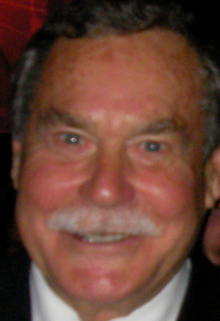
Back رون باراسى (لاعب كورة القدم الاستراليه) ARZ Ron Barassi Czech Ron Barassi Spanish Ron Barassi Basque Ron Barassi French Ron Barassi Italian
| Ron Barassi AM | |||
|---|---|---|---|
 Barassi in 2008 | |||
| Personal information | |||
| Date of birth | 27 February 1936 | ||
| Place of birth | Castlemaine, Victoria, Australia | ||
| Date of death | 16 September 2023 (aged 87) | ||
| Place of death | Melbourne, Victoria, Australia | ||
| Original team(s) | Preston Scouts | ||
| Height | 179 cm (5 ft 10 in) | ||
| Weight | 87 kg (192 lb) | ||
| Position(s) | Midfielder | ||
| Playing career1 | |||
| Years | Club | Games (Goals) | |
| 1953–1964 | Melbourne | 204 (295) | |
| 1965–1969 | Carlton | 50 (35) | |
| Total | 254 (330) | ||
| Representative team honours | |||
| Years | Team | Games (Goals) | |
| Victoria | ? (?) | ||
| Coaching career | |||
| Years | Club | Games (W–L–D) | |
| 1965–1971 | Carlton | 147 (99–47–1) | |
| 1973–1980 | North Melbourne | 198 (130–65–3) | |
| 1964; 1981–1985 | Melbourne | 111 (34–77–0) | |
| 1993–1995 | Sydney | 59 (13–46–0) | |
| Total | 515 (276–235–4) | ||
|
1 Playing statistics correct to the end of 1995. | |||
| Career highlights | |||
|
Club
Representative
Overall
Coaching | |||
| Sources: AFL Tables, AustralianFootball.com | |||
Ronald Dale Barassi AM (27 February 1936 – 16 September 2023) was an Australian rules footballer, coach and media personality. Regarded as one of the greatest and most important figures in the history of the game, Barassi was the first player to be inaugurated into the Australian Football Hall of Fame as a "Legend",[1] and he is one of four Australian rules footballers to be elevated to the same status in the Sport Australia Hall of Fame.
When Barassi was five years old, his father, Melbourne Football Club player Ron Barassi Sr., died in action at Tobruk during World War II. Barassi was determined to follow in his father's footsteps at Melbourne, and heavy lobbying by the club to recruit him resulted in the introduction of the father–son rule, still in use by the AFL today. Barassi subsequently lived with Norm Smith, Melbourne's then-coach and a former teammate of his father. Under Smith's mentorship, Barassi pioneered the ruck-rover position and appeared in six premiership-winning sides, two of which he captained.
In 1964, in what has been called "the most audacious signing in league history", Barassi left Melbourne for a lucrative contract at Carlton. Retiring from playing in 1969, he coached Carlton to two premierships, including a record-breaking grand final comeback in 1970 before what remains the largest crowd in football history; Barassi's famous half-time injunction to his men to play on from marks and handball at all costs came to be remembered as "the birth of modern football".[2] Barassi retired from professional football in 1971, but he was lured back two years later to coach North Melbourne. In 1981, after leading the club to its first two premierships, he returned to an ailing Melbourne, where he initiated the "Irish experiment": the recruitment of Gaelic footballers into Australian rules. His stint at Melbourne, followed by another at the Sydney Swans in 1993–95, proved vital in rebuilding those clubs as viable members of the competition.[3]
Barassi's coaching career was both successful and regarded by many as revolutionary. His clean record and passion for the game―exemplified by his campaigning for the establishment of a national club-level competition―earned him a place as a celebrity and popular culture figure in Australia. He was named a Member of the Order of Australia in 1978, and in 1996 was selected in the AFL's Team of the Century as a ruck-rover.
- ^ "Legends". AFL. Archived from the original on 17 September 2009. Retrieved 28 September 2010.
- ^ Mark, David (21 September 2021). "Melbourne Football Club AFL grand final appearance a chance to emulate 'eternal son' Ron Barassi", ABC. Retrieved 24 January 2022.
- ^ Ron Barassi, Australian Football. Retrieved 22 January 2022.
© MMXXIII Rich X Search. We shall prevail. All rights reserved. Rich X Search